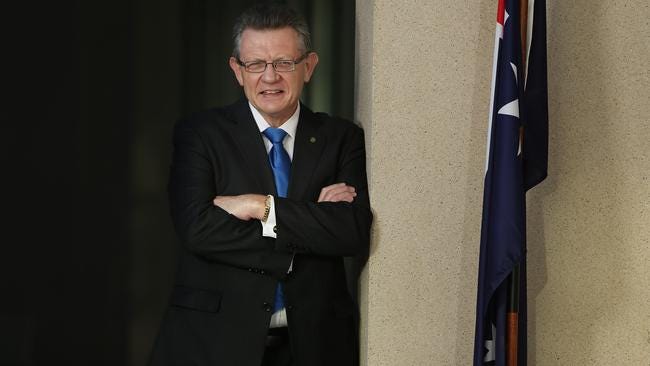Australia’s history is riddled with key events that have shaped it to become the diverse multicultural nation it now is.
This change coincided with post-World War II migration where Australia transitioned from a European-looking Anglo-Saxon country to embracing multiculturalism.
The growth of multiculturalism is vastly responsible for the creation of Australia today.
However, in 2001, following the events of 9/11, former Australian Prime Minister, John Howard, present in Washington when the Pentagon came under attack, feared the backlash toward many ethnic groups could spread to Australia, and impact negatively on Australia’s unity.
Howard wanted to ensure the harmony Australia’s ethnic communities always shared, would be preserved.
He didn’t want any blowback destroying Australia’s society – moving quickly he appointed Queenslander, Gary Hardgrave, as Minister for Citizenship and Multicultural Affairs.
He was the first ever Federal Minister for Citizenship and Hardgrave says while Multiculturalism is about individual respect, Citizenship was about national unity.
Twenty- two years on, Australia faces another crisis and Hardgrave believes the Voice to Parliament will also have great ramifications for Australian society by creating race based division in the Australian Constitution. This would make agile governance impossible and always subject to High Court action.
“One quarter of us are overseas born, another quarter of us has a parent born overseas. We are highly diverse but it’s what we have in common which keeps us united. Enshrining differences into the Constitution unpicks our unity.” Hardgrave says.
Hardgrave believes Australia is under attack from within.
“As a country we’re being weakened by design. Our national economy is shrinking and the Voice to Parliament is causing unprecedented divisions among our many peoples.”
As October 14 draws closer, views are polarised and Hardgrave, has emerged a vocal sceptic.
“A free liberal democracy,” he says, “doesn't endorse different treatment for different classes of citizens. Unity comes by respecting the strength of each individual’s cultural and religious identity. The challenge is ‘be who you are, but be it for Australia’. This is what universal citizenship means while classes of citizenship erodes national unity”.
“Carving out special status based on race in the Constitution is dangerous. It contradicts the fundamental principles Australia was built on."
Warning about the potential of social division the Voice to Parliament could bring, Hardgrave says, "It's not about skin colour; it's about geography - everyone in remote Australia has a tougher road than inner city Australians. Making race-based judgments on resource allocation to assist Australians in need is a perilous endeavour.
“What concerns me is if the referendum is approved, we will be institutionalising division, which is a Pandora's box."
Unafraid to make a provocative comparison, Hardgrave says, “Australia now risks a system of apartheid - separate development based on race.”
Most Indigenous Australians view themselves first as Australians. Labelling them as victims based on their ancestry does more harm than good.
Asked if the Voice could be co-opted for other agendas, Hardgrave was quick to point out the “Inner-city elites often have different priorities than mainstream Australians."
"This could serve as a Trojan Horse for divisive ideologies that neither solve the issues at hand or bring us together as a nation."
Furthermore, Hardgrave added what the potential economic fallout of the proposed Voice may deliver.
"There's an industry built around managing Indigenous issues, and I fear they're more invested in maintaining problems than solving them.
"We’ve already spent billions on various initiatives with limited success."
“Young Australians,” he says, “Face the prospect of inheriting a nation with more government intervention, less freedom, and higher costs.
“The Voice would add another layer to that, touching on an aspect less discussed but crucial for the country's future.”
As someone who has overseen multicultural affairs, Hardgrave is genuinely concerned about the message being delivered to new migrants.
“We promise a united Australia, but actions like this betray that promise. We're risking our economy, our living standards, and causing societal division."
While Hardgrave's opinions resonate with a larger section of the population, they’ve also been criticised for glossing over systemic issues that Indigenous communities face.
Advocates argue the Voice aims to rectify longstanding inequities and offer Indigenous Australians a say in matters that directly affect them.
Hardgrave responds “Adding more bureaucracy to the challenges many remote Aboriginal communities face isn’t going to solve their problems “.
Australia's fraught relationship with its Indigenous populations is part of the subtext of a growing controversial debate.
The 'Sorry' movement, aimed to reconcile with historical wrongdoings, but significant gaps in social and economic metrics indicates a lot more work needs to be done.
Hardgrave's arguments tap into a larger, global conversation around how democracies should balance majority rule and minority rights.
"Democracies protect and nurture minorities, but not at the expense of creating an imbalanced society. Creating a 'special' race-based channel for a particular group could lead to other groups demanding similar concessions, making governance more fragmented and less effective."
The legal complexities according to Hardgrave associated with the Voice will introduce a quagmire of legal questions.
“How it influences other constitutional mechanisms or supersede existing laws or coexist alongside them a legal minefield,” he says. “The Voice doesn’t create unity or build respect “.
It’s a moral conundrum Australia faces as it ponders a constitutional amendment – a bridge Australia will have to cross, on October 14.




